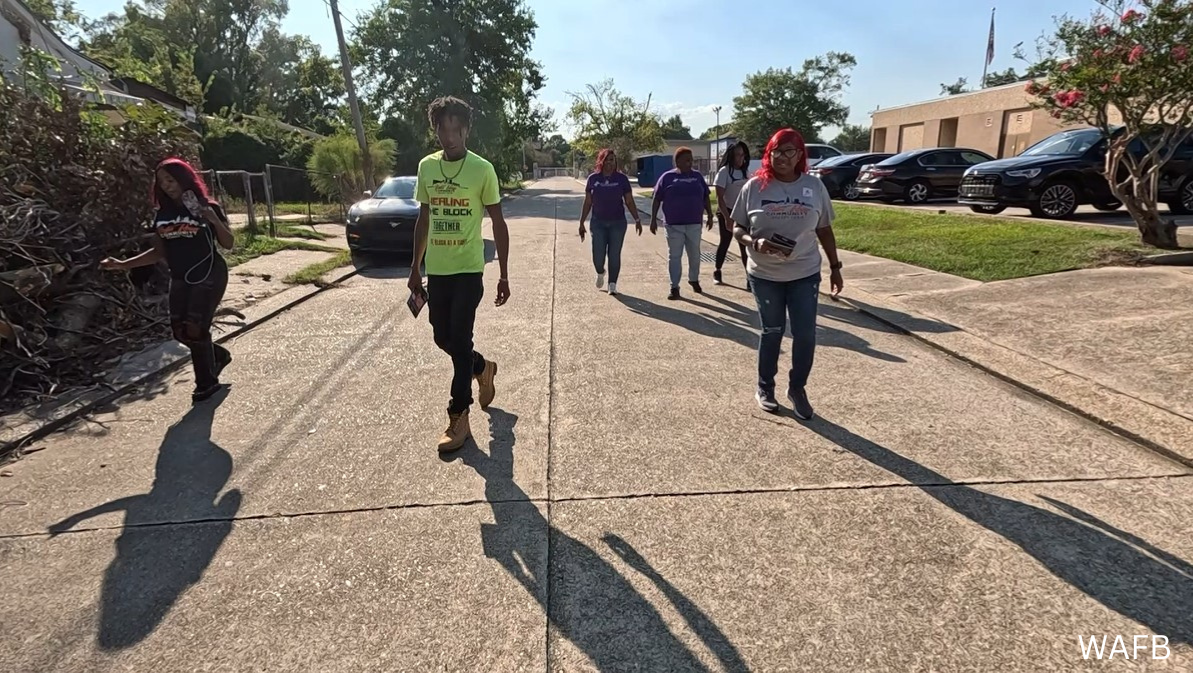BATON ROUGE, La. – As Louisiana Governor Jeff Landry pushes for the deployment of the National Guard to address crime concerns in Baton Rouge and other major cities, local community leaders say they are already working daily to reduce violence through grassroots strategies. The Baton Rouge Community Street Team, a boots-on-the-ground initiative, continues to focus on prevention and engagement, even as state leaders weigh more militarized solutions.
A Grassroots Approach to Public Safety
Every day, the Baton Rouge Community Street Team gathers to analyze crime data and strategize where their outreach can make the most impact. The group concentrates on some of the city’s hardest-hit neighborhoods, specifically in zip codes 70802 and 70805. Large, color-coded maps guide their meetings, marking areas where murders, shootings, and robberies have been tracked since 2021.
Program Director Sateria Tate Alexander explained the significance of visual data mapping: “It’s one thing when you’re just responding to things that are happening, but it’s another thing when you can actually see in a concentrated view exactly where your problem areas are.”
For the team, these maps are not just statistics—they are reminders of lives lost, families impacted, and communities struggling to heal. By using this data-driven approach, the group is able to focus on neighborhoods where tensions are highest and direct their efforts toward meaningful interventions.
Meeting People Where They Are
Unlike traditional law enforcement, the Baton Rouge Community Street Team prioritizes face-to-face engagement. Members regularly walk neighborhoods, talking directly with residents to hear concerns, build trust, and provide resources. Their work is based on the belief that reducing crime starts with strengthening community relationships.
Their latest neighborhood walk centered on inviting residents to a public safety roundtable discussion. The meeting will focus on the potential deployment of the National Guard, giving community members a chance to voice their fears, hopes, and opinions on what such a presence could mean for daily life in Baton Rouge.
“We’re not here to disrupt law enforcement,” Alexander said. “We’re here to be a complement—making sure we are helping our community thrive and do better.”
Governor’s Call for Federal Assistance
On Monday, Governor Jeff Landry sent a formal request for federal assistance, seeking authorization to activate up to 1,000 Louisiana National Guard troops in three cities, including Baton Rouge. The governor framed the move as necessary to address ongoing public safety concerns.
Interestingly, the call for military involvement comes at a time when crime statistics show violent crime rates trending downward. This disconnect has sparked debate, with some residents supporting the additional resources while others fear that the presence of the National Guard could deepen mistrust between law enforcement and the community.
“Do you feel that people may be scared when they see them on the streets?” WAFB reporter Deon Guillory asked Alexander.
“Absolutely,” she replied. “You have to look at it from a trauma-informed lens. Historically, our communities have fear of law enforcement. Some of it is based on personal experiences, some of it on historical experiences. But nonetheless, those fears really do exist.”
Memories of Protest and Fear
For some in Baton Rouge, the possibility of seeing the National Guard patrolling local streets brings back unsettling memories. High-Risk Interventionist Khoury Brown recalled the Alton Sterling protests of 2016, when the city became a flashpoint for racial justice demonstrations following Sterling’s death at the hands of police.
“It was a fear among Black people and everybody out there protesting,” Brown said. “But it was like, they didn’t care about the fear—only the issue at hand.”
That lingering sense of unease, rooted in both lived experience and generational memory, underscores why many in the community see military presence as more harmful than helpful.
Addressing Root Causes of Crime
The Baton Rouge Community Street Team stresses that crime cannot be solved solely by law enforcement or military intervention. Their mission emphasizes addressing the deeper issues driving violence, including poverty, lack of opportunity, and systemic inequities.
“If we really want to respond to the crime rates that we’re seeing, then we need to explore why we’re having the crime that we’re having,” Alexander said. “We need to create solutions that actually speak to and address those underlying issues. The National Guard is not that.”
To the team, progress means investing in programs that give young people alternatives to violence, supporting families in crisis, and connecting residents to resources that can help break cycles of crime and trauma.
Preparing for What’s Next
As the debate continues, the Baton Rouge Community Street Team is moving forward with its scheduled public safety roundtable. The event will offer an open forum for residents to ask questions about what National Guard deployment would look like in practice and to share their concerns about the broader implications.
Regardless of the governor’s decision, the team says its work will not slow down. Their commitment is to be present in the community, one conversation and one neighborhood at a time.
“National Guard or not, we’ll keep doing what we do,” Brown said. “This city belongs to its people, and we’re here to stand with them.”
%20(4).png)




.jpg)
.png)
.png)
.png)
